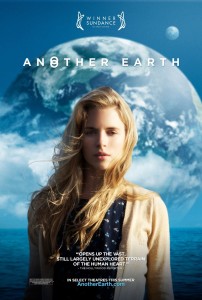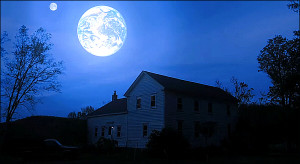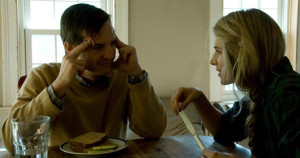 If you approach Another Earth with the intention of digesting it literally, don’t. Mike Cahill’s film isn’t just about the neat idea of planet identical to our own coming into reality; it’s about redemption and second chances.
If you approach Another Earth with the intention of digesting it literally, don’t. Mike Cahill’s film isn’t just about the neat idea of planet identical to our own coming into reality; it’s about redemption and second chances.
The movie begins and ends with Rhoda. Initially, we see a beautiful, young woman ready to embark on the collegiate life at MIT. Celebrating her acceptance into the astrophysics program, she does what most young people do, she parties. As she’s driving home (under the influence), she hears the radio announcement about the discovery of Earth II, a planet that appears to be a duplicate of our own coming into view. She looks up, searching for it in the sky through her car window, then it happens…
Head-on into a car filled with John Burroughs, his expectant wife, and their young son. Rhoda stumbles out of her broken car to check on them, but it’s far too late. We see the child face down in the snow and we feel the horror, the gravity, of this irreversible event. John’s family is gone, only he remains barely breathing.
Four years later, Rhoda has served her time and is released. John never found out who crashed into them that night for fear he might kill the person himself. Rhoda disappears. No more MIT, she’d forget her own name if she could. She hides under baggy jeans and hoodies and takes up a job as a janitor in a high school so she can avoid talking to people whenever possible.
During these four years Earth II has moved closer. There seems to be a lack of physical effects between the two planets. I don’t believe this was some slip of scientific knowledge on the writers’ part, there’s a deeper reason. Throughout the film, the beautiful image of Earth II hangs in the sky like our own planet’s cosmic mirror. We feel the magnitude of possibilities this new Earth could mean for us.
 A woman named Joan Tallis is the first to make radio contact with the other Earth. She ends up speaking to herself… another self. My personal theory is that the other Earth isn’t necessarily a second planet, but more like the Earth of an alternate timeline. That idea remains consistent with theme of second chances. This means that it’s possible for any of us to have another “self” up there. You now have philosophical questions to ponder… Was I even born on this second Earth? Did the other me make the same mistakes I did? What does their life look like? What would you say to your other self if you could?
A woman named Joan Tallis is the first to make radio contact with the other Earth. She ends up speaking to herself… another self. My personal theory is that the other Earth isn’t necessarily a second planet, but more like the Earth of an alternate timeline. That idea remains consistent with theme of second chances. This means that it’s possible for any of us to have another “self” up there. You now have philosophical questions to ponder… Was I even born on this second Earth? Did the other me make the same mistakes I did? What does their life look like? What would you say to your other self if you could?
Earth II magnifies the idea of our smallness. The universe is expansive, wondrous, and possibilities are endless. As our understanding of it is constantly changing and flowing, so are our lives. The film plays a lot with the ideas of chance and fate. They do not seem to be enemies here, but rather two figures dancing through space and time, seamlessly binding the universe together.
Rhoda attempts to visit John with the intention of apologizing for what she’s done. She thinks of herself as despicable, unforgivable. Though it was an accident, it was still her fault. She finds John in just as much disrepair and brokenness as the house he lives in. She loses her nerve and fumbles through a lie about being with a cleaning service and trying to find new clientele. She hopes that he’ll just turn her away, but he doesn’t. Though he’s gruff about it, he accepts her fake offer for a free trial cleaning.
Now Rhoda has put herself in a predicament. She’s stuck in her lie, but she sees that maybe this is a way she can help him. It won’t undo the horrific damage done, but John clearly needs help when it comes to the house. As time passes, they grow unexpectedly fond of each other and through this we see their dire need to move on from that fateful night.
 One of my favorite scenes is when Rhoda tells John a story about a Russian cosmonaut who heard a beeping sound in his console that he couldn’t stop and it was driving him mad. The cosmonaut realized that, if he let it, the sound really would make him crazy. So he chose to let the sound be soothing to him, music to his ears, and everything changed. We are left with the notion that when something seems like it will be our undoing it can, in fact, be reprogrammed in our minds and overcome. We have things we can’t control, but we can choose to be defeated by those things, or choose to make something new and beautiful out of them.
One of my favorite scenes is when Rhoda tells John a story about a Russian cosmonaut who heard a beeping sound in his console that he couldn’t stop and it was driving him mad. The cosmonaut realized that, if he let it, the sound really would make him crazy. So he chose to let the sound be soothing to him, music to his ears, and everything changed. We are left with the notion that when something seems like it will be our undoing it can, in fact, be reprogrammed in our minds and overcome. We have things we can’t control, but we can choose to be defeated by those things, or choose to make something new and beautiful out of them.
In a following scene, John takes this lesson further on a personal level. Before his tragedy, he was a music teacher. He takes Rhoda to his school’s auditorium and busts out a string bow and… a saw? As an audience we’re just as baffled as Rhoda for a moment, until he starts playing it. By bending the metal of the saw and using the bow, John takes its odd sounds and creates discernible musical notes. Along with themes of forgiveness, particularly self-forgiveness, Another Earth reminds us that tragedy often gives birth to beauty. We are tense as viewers because John still doesn’t know who she is, but we get a glimpse of hope for him here and start to believe he will pass through the storm.
Another Earth has an intense climax and wraps up with a jaw-dropping ending. I’ll leave that stuff out because I hope you’ll see this little gem for yourself. I adore this film’s use of gritty camera work, and different variations of blue and gold lighting to set the tone from scene to scene. It also has an invigorating musical score composed by Fall on Your Sword, weaving together orchestral/piano and binaural beats.
Impressively, Another Earth was made with a small budget, and Mike Cahill shot and edited it himself while co-writing the story with lead actress Brit Marling. This inspired me so much when I first saw the film in 2011 and shifted my mindset as a filmmaker. I saw a great example of a small, simple film that still managed to challenge the imagination with broad range of ideas and questions. Sometimes less really is more.
